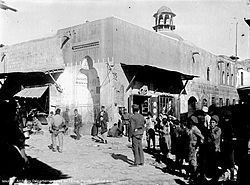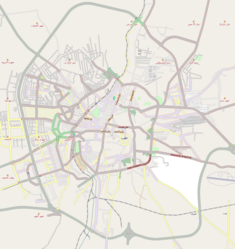The Waqf of Ibshir Mustafa Pasha (AR: وقف ابشير باشا) is a sizeable 17th century endowment complex built by wazir Ipshir Mustafa Pasha in 1652 who was then governor of Aleppo. It has been described as of the largest and most interesting building complexes to be erected in Aleppo during Ottoman times.
| Waqf of Ibshir Mustafa Pasha | |
|---|---|
| Native name وقف ابشير باشا (Arabic) | |
 Water fountain of the Waqf Ibshir Mustafa Pasha Complex | |
| Location | Al-Jdayde, Aleppo, Syria |
| Coordinates | 36°12′23.2″N 37°09′25.4″E / 36.206444°N 37.157056°E |
| Built | 1652 |
Background
editThe Ibshir Mustafa Pasha Waqf complex is one of a number of notable historic structures built in 17th century Aleppo.[1] The complex included a khan, three qaysariyya, textile looms and dye workshop, a souk, bread ovens, a sebil and a coffee-house noted for its fine decorations.[2][3] The qaysariyyas in this area of Aleppo specialized in textile manufacturing. They were active until the late 20th century.
The Bahram Pasha waqf hammam's lies in an adjacent building. They provided a shared 'public' space and commercial opportunity for local Christian and Muslim inhabitants and led to its neighbourhood of Al-Jdayde to become Aleppo's second economic centre.[4][5][6] Aleppo's Beit Ghazaleh and Beit Ajikbash museums lie adjacent to the waqf complex.[4]
The coffeehouse hall of the waqf complex of Ibshir Mustafa Pasha is one of the largest non-commercially used spaces of Ottoman Aleppo.[2]
Recent developments
editThe complex suffered damage from street fighting and intermittent shelling throughout Syria's civil war. In particular, a series of underground explosions that occurred in April 2015 devastated the building and surrounding area.[7][8][9] The elaborate facade of the hall of the coffee-house, as well as its first row of vaults, were destroyed during the war.[8]
The waqf complex is listed as one of 25 most significant restoration sites proposed for the Ancient City of Aleppo.[10]
Further reading
edit- David, Jean-Claude. Le waqf d’Ipšīr Pāšā à Alep (1063/1653): Étude d’urbanisme historique. Avec la collaboration de Bruno Chauffert-Yvart. Damascus: Presses de l'Ifpo, 1982. (in French)
- L.I.S.A.teamwork Gerda Henkel Stiftung (2017) The Waqf of Ibshir Mustafa Pasha | وقف ابشير باشا (in English)
- Watenpaugh, Heghnar Zeitlian.(2004) The Image of an Ottoman City: Imperial Architecture and Urban Experience in Aleppo in the 16th and 17th Centuries. Leiden: Brill
- Die Organisation des religiösen Raums in Aleppo. Die Rolle der islamischen religiösen Stiftungen (auqāf) in der Gesellschaft einer Provinzhauptstadt des Osmanischen Reiches an der Wende zum 19. Jahrhundert. Beirut: Orient-Institut Beirut, 2009. (in German)
- Jean-Claude David, Thierry Boissière. (2014) La destruction du patrimoine culturel à Alep : banalité d’unfait de guerre?. Confluences [en] Méditerranée, l’Harmattan 2014/2 N.89 pp.163-171 (in French)
- Stefan Knost (2015) The Christian Communities in Ottoman Aleppo and the Role of Religious Endowments (Waqf), in: Hidemitsu Kuroki (ed.), Human Mobility and Multi-ethnic Coexistence in Middle Eastern Societies 1, pp. 41-57.
- elysesemerdijan (2024, February 29). The Waqf: Where Religion Meets Urbanity. Religion and Urbanity: Reciprocal Formations. Retrieved May 7, 2024, from https://doi.org/10.58079/vxho
- Rami Alafandi (2017) Art and architectural history in Aleppo Heritage Catalogue, Museum for Islamic Art in Berlin, L.I.S.A.teamwork Gerda Henkel Stiftung
Gallery
edit-
Facade of Waqf Cafe
-
Dome of Waqf Cafe
-
Rooftop view over Waqf Hammam
-
Outline drawing of the Waqf Complex of Ibshir Pasha in Aleppo
-
Facade of the Waqf Complex of Ibshir Pasha in Aleppo's Jdeidah district
References
edit- ^ Stefan Knost. "The Waqf of Ibshir Mustafa Pasha | وقف ابشير مصطفى باشا Urban and social historical background". L.I.S.A. WISSENSCHAFTSPORTAL GERDA HENKEL STIFTUNG. Retrieved 2019-06-13.
- ^ a b David, Jean-Claude (2015-03-16). Le Waqf d'Ipšīr Pāšā à Alep (1063-1653) : Étude d'urbanisme historique. Études arabes, médiévales et modernes (in French). Beyrouth: Presses de l’Ifpo. ISBN 9782351595077.
- ^ Deguilhem, Randi. "Waqf in the City" (PDF). The City in the Islamic World. 94/1 & 94/2: 932.
- ^ a b Stiftung, Gerda Henkel. "Waqf of Ibshir Mustafa Pasha - Urban and social historical background". L.I.S.A. WISSENSCHAFTSPORTAL GERDA HENKEL STIFTUNG. Retrieved 2019-06-13.
- ^ Deguilhem, Randi (2008-01-01). "The Waqf In The City". The City in the Islamic World (2 Vols.): 929–956. doi:10.1163/ej.9789004162402.i-1500.248. ISBN 9789047442653.
- ^ Ghazale, Pascale (2011). Held in Trust: Waqf in the Islamic World. ISBN 9789774163937. Retrieved 2019-11-19.
{{cite book}}:|website=ignored (help) - ^ "ASOR Cultural Heritage Initiatives Weekly Report 38 (April 27, 2015)". ASOR Cultural Heritage Initiatives. 2015-05-28. Retrieved 2017-01-03.
- ^ a b Rami Alafandi, Issam Ballouz, Alaa Haddad (August 2017). "Damage assessment | تقييم الضرر". The Waqf of Ibshir Mustafa Pasha - Damage Assessment. Retrieved 2019-06-13.
{{cite web}}: CS1 maint: multiple names: authors list (link) - ^ Video Excerpt: Underground explosions in Al Jdayde April 2015 on and near Sahat al Hatab Aleppo, 30 April 2015, retrieved 2019-06-13
- ^ Directorate General of Antiquities and Museums & Aga Khan Trust for Culture (2019). [Draft] PLAN OF RECONSTRUCTION AND RECOVERY OF THE ANCIENT CITY OF ALEPPO Strategy and Proposed Restoration Projects. p. 194.
